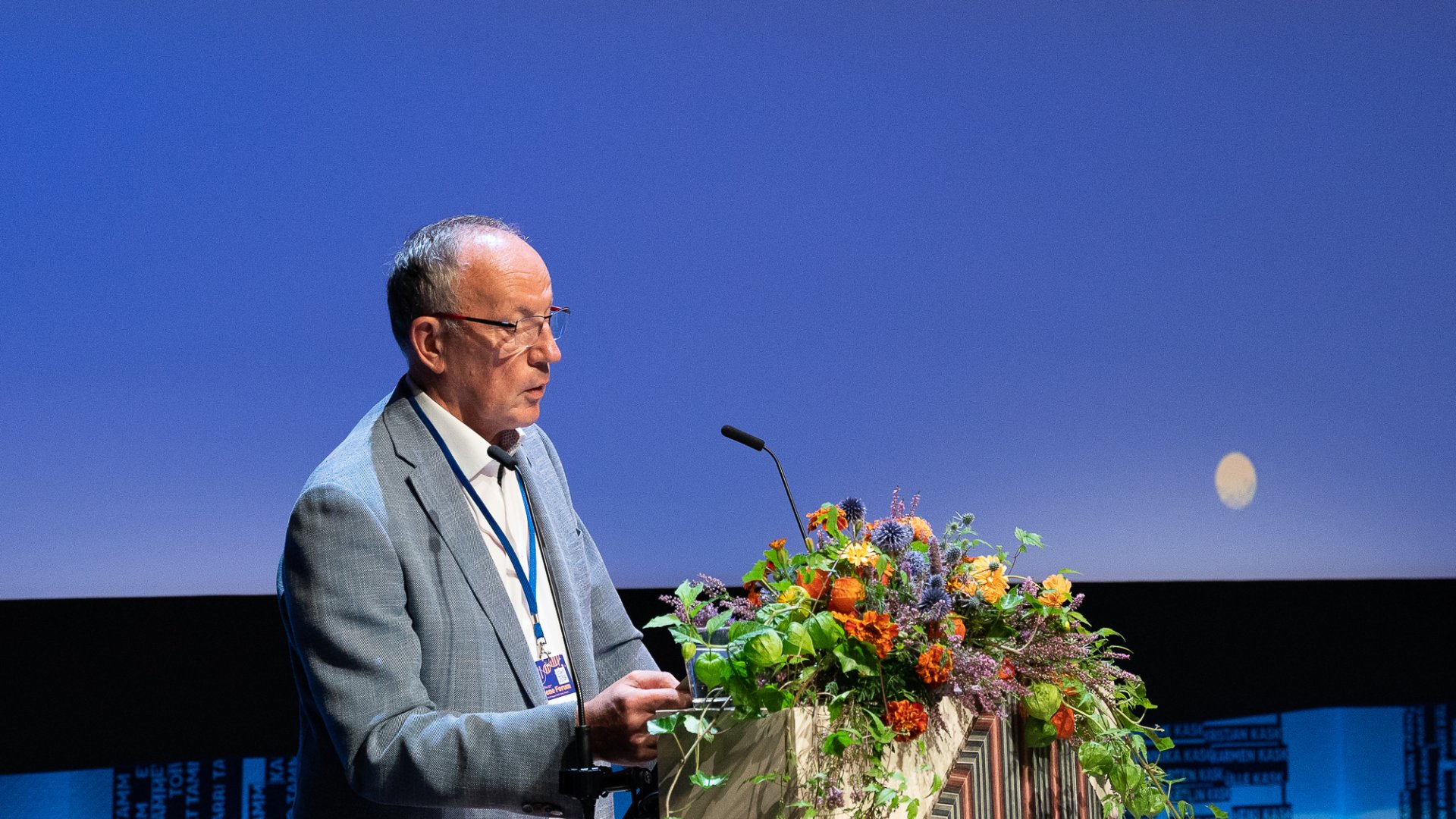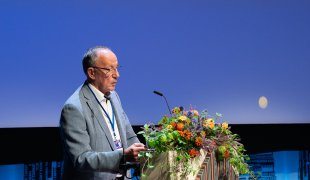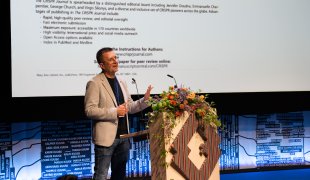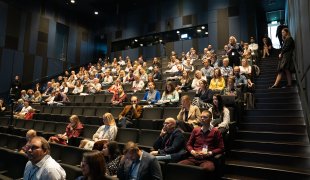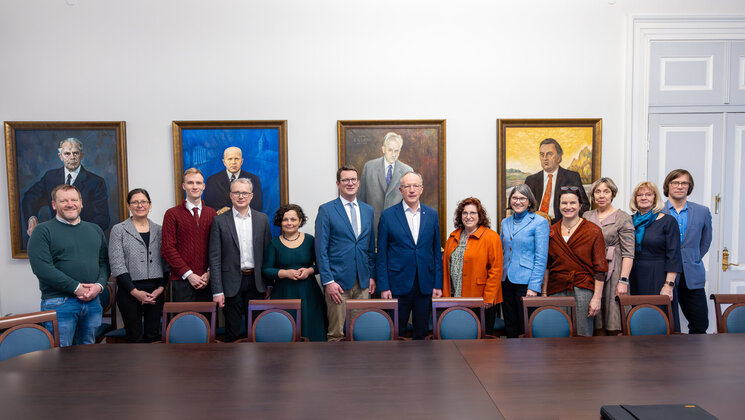Latest Research from CRISPR Technology to Microbiome Presented at Gene Forum 2023

Last week, the 22nd international scientific conference, Gene Forum, took place, featuring presentations from 21 experts across Europe and the USA. Over the course of two days, they shared insights into their latest research, covering topics ranging from personalised medicine advancements to the genetics of mental health.
The conference encompassed seven thematic sessions: genomics of monogenic diseases, pharmacogenomics, personalised medicine, microbiome, single-cell omics, mental health, and population genetics. In the following sections, we present the most significant insights that emerged from these sessions.
Keynote: Prof Virginijus Šikšnys
- CRISPR gene technology holds the potential for broader clinical application and is already being used in experimental therapies. However, technical challenges impede its safe usage, prompting the exploration of alternative approaches.
- The Cas family of proteins plays a pivotal role in the CRISPR system, cleaving DNA. Recent studies have expanded our understanding of the CRISPR system's diversity, revealing hundreds of new Cas family orthologs. To enhance CRISPR approaches, a deeper understanding of these alternatives is imperative.
- One challenge with Cas proteins is their physical size. Therefore, efforts should focus on identifying smaller, more efficient family members. The recently discovered TnpB family member is three times smaller than commonly used Cas proteins and functions effectively in human cells. It employs a novel DNA targeting mechanism, offering alternative molecular avenues.
- The development of new genome-editing tools contributes to understanding human cells and health, potentially revolutionising treatment methods and diagnostic tools.
Genomics of monogenic diseases session
- Dr. Monkol Lek highlighted a major challenge in clinical genetic diagnostics: the ambiguity of gene variants. To address this issue, comprehensive functional studies have been developed to evaluate the impact of all potential gene variants within a given gene. These studies could serve as the foundation for clinical diagnostics.
- Dr. Angela Lek emphasised the rapid advancement of gene therapy. While more patients globally are benefiting from gene therapy, it's crucial to acknowledge the potential for significant side effects. Thus, rigorous scientific investigation into these adverse effects is paramount.
- In his presentation, Dr. Bjarne Udd discussed the growing spectrum of genetic diseases affecting diverse organ systems, such as musculoskeletal, skeletal, and nervous systems. Besides monogenic diseases resulting from single gene mutations, there's increasing recognition of di- and oligogenic combinations where genetic diseases result from multiple gene mutations.
Pharmacogenomics session
- Professor Mikko Niemi underscored the efficacy of statins in cholesterol reduction when lifestyle changes are inadequate. His research group extensively studied how individual genes influence statin concentrations in the body, impacting the risk of side effects. One gene variant, present in nearly 15% of Europeans, affects the concentration of various statins in the blood to varying degrees. For example, individuals with this variant have 2.7 times higher drug concentrations for simvastatin, 1.4 times for atorvastatin, and 1.1 times for rosuvastatin. The Helsinki University Hospital has also initiated pharmacogenetic testing, doubling the number of ordered tests in the past year.
- Professor Espen Molden from the University of Oslo and Diakonhjemmet Hospital outlined how measuring drug concentrations post-treatment initiation aids in determining patient compliance (with 20% non-compliance) and optimizing dosages for effective therapeutic levels. Their hospital conducts annual concentration measurements on 60,000 samples, with nearly 15,000 individuals consenting to data analysis, including genetic information. This analysis has unveiled associations between gene variants and drug concentrations in the blood. Considering smoking's impact on liver enzyme activity, affecting drug metabolism, they also discovered interactions between smoking and genetic variants influencing drug concentrations in the blood.
- Professor Jesse Swen from Leiden University Medical Center provided an overview of the collaborative PREPARE study, evaluating the introduction of pharmacogenetic panel tests to reduce adverse drug reactions and associated costs. Primary outcomes revealed a 30% reduction in adverse drug reactions in the pharmacogenetic testing group compared to the control group.
Personalised medicine session
- Associate Professor Andrea Ganna emphasized that large-scale genome-wide studies (GWAS) of complex diseases reveal gene-disease connections, explaining disease mechanisms. However, these studies don't predict disease course, severity, or individual treatment responses.
- Postdoctoral Researcher Kadi Lõhmussaar discussed future personalized medicine potential: growing 3D organoid models from cancer patients' tumors in labs. Studying these models could unveil mechanisms driving tumor cell division, enabling tailored treatments.
Microbiome session
- Professor Karsten Kristiansen provided insight into rapidly expanding knowledge about the gut microbiome's composition. New bacterial strains, genes encoded by bacteria, and metabolites produced through bacterial activity have been rapidly identified and described. Prof. Kristiansen also introduced studies demonstrating the gut microbiome's impact on weight loss, revealing that its effects depend on the initial gut microbial community.
- Professor Susanne Brix-Pedersen illustrated how the gut microbiome influences the immune system's early development in children's first months. Enzymes produced by early gut microbes regulate immune cell development and immune response establishment, as demonstrated in her research.
- Associate Professor Anne Salonen presented the female reproductive system's microbiome's impact on infant microbiome community development. Anne Salonen stressed that early bacterial colonisation is irreversible, shaping early immune systems and overall physiology with lasting health effects.
Mental health session
- Associate Professor Alfonso Buil Demur from the University of Copenhagen and Copenhagen Hospital discussed using Danish registries to study psychiatric disorders' comorbidity with somatic diseases. Registry-based pedigree data can refine heritability estimates and assess genetic risk for psychiatric and cardiometabolic disorders, providing accurate heritability assessments, understanding diseases' genetic roles, and investigating causal mechanisms.
- Professor Eivind Ystrøm from the University of Oslo discussed intergenerational risk transmission of mental disorders. He focused on the "genetic environment" and indirect genetic effects, where parental heritable traits shape the environment provided to offspring. Prof. Ystrøm utilized parent-child trio-based genomic data and examples from the Norwegian cohort study.
- While advancements in science and medicine extend average lifespans, they also increase age-related disease prevalence, including dementia. Dr. Sara Hägg from the Karolinska Institute presented causal aging mechanisms, protective factors, and related biomarkers (epigenetic clock, telomere length). These insights may pave the way for preventing age-related diseases, enhancing quality life years.
Population genetics session
- In this session, Karoline Kuchenbäcker discussed how populations with diverse genetic ancestries benefit from genomic medicine and the need for better genetic ancestry-based reference population stratification for accurate genetic variant functional categorisation.
- Furthermore, Ida Moltke highlighted the importance of studying small isolated populations for understanding disease genetics and providing personalized medicine for the studied population.
The conference also featured a poster session, showcasing the scientific work of junior research fellows and more extensive research projects involving the Institute of Genomics, University of Tartu (including SafePolyMed, ComorMent). The Gene Forum was organized by the Institute of Genomics, UT (Center for Genomics, Evolution, and Medicine, cGEM) and the Gene Center. The event received support from esteemed companies in the field (Illumina, BioNordika, LanLab, Diamedica, Thermo Fisher Scientific).


